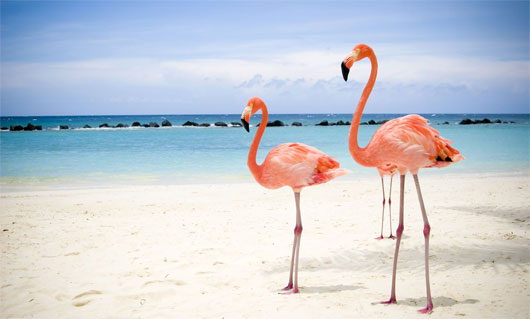The life secret of animals
After a period of research, experts discovered animals have many ways to prolong life in the harsh environment of nature.
The Proceedings of the Royal Society B report - done in birds and mammals - shows that large animals often live longer for two reasons. Zoologist Kevin Healy of Trinity University in Dublin (Ireland) explains that, first of all, a large body needs time and resources to grow. And when they reach adulthood, they often avoid external threats, such as being eaten by predators (unless they are stronger) or lack of food (because their bodies can store fat. good). Meanwhile, animals that need time to reach physiological maturity tend to live long. For example, head whales mature slowly and can live up to 221 years old. Smaller and more mature dwarf whale whales have a shorter life span than bent heads.

Flamingos are long-lived species in the bird world - (Photo: unh.edu)
Species living in underground caves also tend to live longer than others . Healy explained that caverns are extremely effective measures to avoid enemies, and are a good place to prevent in bad weather, such as avoiding wintering, avoiding cold, and being able to store food safely to avoid lack of food in the short term. Similarly, accommodation and foraging activities on trees help species to avoid the attack of wild animals. Foods like fruits are very easy to find, while those that eat on the ground need more effort to hunt. Although it is impossible to imitate animals that live on trees, humans can somewhat learn in a way that is in harmony with nature of other species. Although genetics, habitats, climates and other factors are beyond the control of individuals, Healy says each species has a certain level of control over their lifespan. For example, spending less time with trees can help relieve pressure, thereby reducing the risk of disease.
Research results show that species that feed during the day or night seem to increase their chances of prolonging life , for example bats love nightlife, and can live up to 40 years old, while most Other small-sized mammals often die early. Animals that work at dawn and sunset often have shorter lifespans. This may be due to a short period of time to eat, affecting the quality of their meals. In addition, the flying or gliding ability of winged species is the most important factor for bird's longevity. Flying in the sky expands the opportunity to seek food, avoid predators and help them have more choices in terms of settlement. The long-lived representative of this group is swans, flamingos and large seabirds. A flamingos at the Adelaide Zoo in Australia can live at least 83 years old.
As for humans, we are also relatively large in size and can fly thanks to the machines. The oldest living person in the world must be under 120 years old. However, compared to the entire animal world, humanity is still far behind invertebrates, such as some sponges and shellfish that exceed the 250-year threshold.
- The secret life of the hamsters
- 5 rules to help you live longer than 12 years
- Images of secret life in the womb
- Each animal has the secret to seeing in the dark differently
- Secret weapons of insects
- Animals take human life in the blink of an eye
- The secret of the relationship between names and life expectancy
- The secret to long life, long life
- Simple trick to live long
- Secret to escape from the chaotic crowd
- Uncover the secret to help animals survive the Chernobyl disaster
- The secret life of penguins
 Animal 'suffering' after hibernation
Animal 'suffering' after hibernation Why do goats climb well?
Why do goats climb well? Scientists were surprised to see chimpanzees eating turtles
Scientists were surprised to see chimpanzees eating turtles Giant catfish died deadly due to drought in Thailand
Giant catfish died deadly due to drought in Thailand